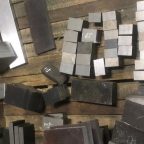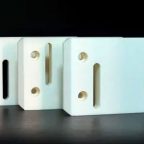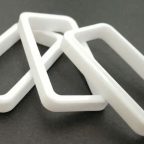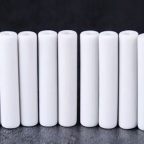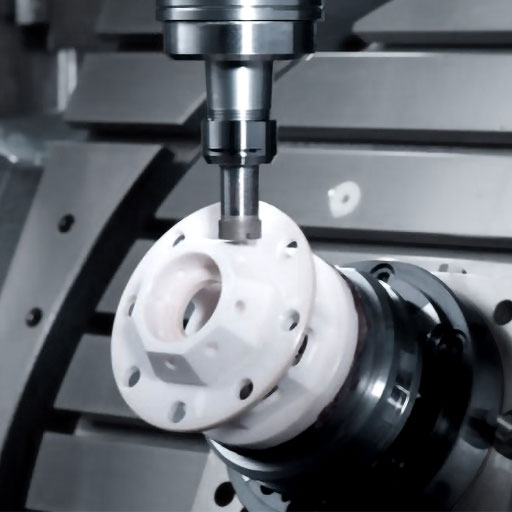Zirconia ceramics and alumina ceramics are relatively common in the market, and their advantages are particularly prominent. Similar industrial ceramics, silicon nitride ceramics, also have some unique advantages. Next, let’s take a look at silicon nitride ceramics and its application in Use in aerospace and more!
Silicon nitride ceramics are used in aerospace and military industry, mechanical engineering, communications, electronics, automobiles, energy, chemical biology and other fields because of their high temperature resistance, corrosion resistance, wear resistance and unique electrical properties.
Especially in the field of high temperature structural ceramics, silicon nitride ceramics are new materials with the best comprehensive properties, the most application potential and the hope to replace nickel-based alloys and be widely used in high temperature fields.
1. Basic properties of silicon nitride
The detailed performance indicators of silicon nitride are as follows:
- 1. Heat resistance, under normal pressure, Si3N4 has no melting point, it decomposes directly at about 1870 °C, and it can resist oxidation to 1400 °C, and the actual use reaches 1200 °C (mechanical strength will decrease when it exceeds 1200 °C).
- 2. Small thermal expansion coefficient (2.8-3.2) × 10-6/℃, high thermal conductivity, thermal shock resistance, no cracking from room temperature to 1000℃ thermal shock.
- 3. The friction coefficient is small (0.1) and has self-lubricating properties (the friction coefficient of the metal surface with oil is 0.1-0.2).
- 4. Stable chemical properties, corrosion resistance, no reaction with other inorganic acids except hydrofluoric acid, no reaction with oxygen in a dry atmosphere of 800 ℃, over 800 ℃, a silicon oxide film begins to form on the surface, and as the temperature rises The high silicon oxide film gradually becomes stable, and a dense silicon oxide film can be formed with oxygen at about 1000 ℃. It can be kept basically stable to 1400℃.
- 5. Silicon nitride has high hardness, wear resistance, Mohs hardness is second only to diamond, cubic boron nitride, boron carbide, silicon carbide, and is resistant to mechanical impact.
- 6. Silicon nitride is a covalent bond compound, which is difficult to densify. Sometimes it needs to add additives. The density is about 3.4 (different molding methods have different densities, and hot pressing molding has a higher density. The density of steel is about 7.85, and the density of titanium is about 7.85). The density of the alloy is about 4.5, and the unit is g/cm3).
- 7. High brittleness is a common problem of most ceramic materials. Continuous fibers can be used to toughen them to increase their toughness.
Application of silicon nitride ceramics in aerospace and military industry
Aviation manufacturing is the most high-tech field in the manufacturing industry. It belongs to advanced manufacturing technology and is a leader in new materials, new processes and new technologies. Taking the turbine engine of the aircraft as an example, the application of silicon nitride in aviation manufacturing is described.
aircraft turbine engine
Taking the turbojet engine of an aircraft as an example, the temperature of the compressor parts is below 650 ℃, and currently titanium alloys, aluminum alloys and heat-resistant steels are mainly used. The temperature in the combustion zone of the combustion chamber is as high as 1800-2000 °C. After the introduction of air cooling, the wall temperature of the combustion chamber is still above 900 °C. , The protective layer is often sprayed, and the dispersion-strengthened alloy can be used to prepare a combustion chamber resistant to 1200 ° C without coating.
Mechanism ceramic silicon nitride is heat-resistant and can still have high strength and stiffness at 1400 °C (but the mechanical strength will decrease when it exceeds 1200 °C), but it is relatively brittle. The use of continuous fiber reinforced reinforced ceramics can be used in turbine components, especially It is the ceramic blades of the small engine, the outer turbine ring and the air bearing. In addition, the specific density of silicon nitride ceramics is only 41% of that of steel bearings, which can effectively reduce the weight of aircraft engines and reduce fuel consumption.
Pintejin machining ceramic service include : Alumina Ceramic Parts, Zirconia Ceramic, Silicon Carbide Ceramic, CNC Machined Aluminum Nitride Ceramic, Machinable Ceramic Parts, Glass Ceramic,Macor Ceramic,Powder Metallurgy Dies,Ceramic Injection Molding,Ceramic Dry Pressing,Ceramic Extrusion Dies
